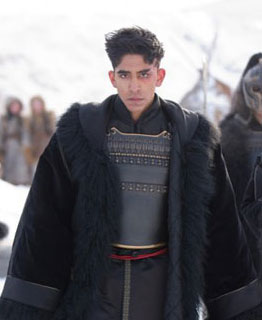 With the summer 2010 release of Avatar The Last Airbender, the controversy over the white washed casting continues with director M. Night Shyamalan finally speaking out during recent press interviews… and seems to completely miss the point.
With the summer 2010 release of Avatar The Last Airbender, the controversy over the white washed casting continues with director M. Night Shyamalan finally speaking out during recent press interviews… and seems to completely miss the point.
Granted, anyone is allowed to defend their project, especially if it’s a multi-million dollar feature film of an immensely popular animated series, but come on! At least try understand what fans were (and continue to be) in uproar about.
According to UGO.com, who was able to sit in a round table discussion with the director, Shyamalan dubbed the whole issue as “irony.”
Well, it is the most culturally diverse tent-pole movie ever made. And I’m proud of it. It’s part of what drew me to the material, to see the faces of our whole world in this new world. And only time will assuage everyone and give them peace. Maybe they didn’t see the faces that they wanted to see but, overall, it is more than they could have expected. We’re in the tent and it looks like the U.N. in there.
I’m still a bit confused over Shyamalan’s definition of irony. Is it ironic that despite the major roles going to mostly Caucasian people (aside from Zuko, which occurred after the protests against white-washing began), the majority of the cast — including extras — were diverse? Is he counting the crew in as there, as well? So despite the fact that three of the main characters are Caucasian (wearing Asian inspired costumes), it’s all good, because everyone who you’re not going to pay attention because they’re milling around in the background isn’t? What about the fact that the original casting call listed “Caucasian or any other ethnicity?” All I really know for sure is that Shyamalan’s irony made everyone on the 8A mailing list start belting out Alanis Morrisette (more on that later.)
The folks over at io9 also asked him the same question about the fans’ issues over the casting of Caucasian actors. His response?
The great thing about anime is that it’s ambiguous. The features of the characters are an intentional mix of all features. It’s intended to be ambiguous. That is completely its point.
Interesting. I don’t quite agree with his statement about racial ambiguity in anime, and I know that itself is up to debate. I consider everyone in anime to be Japanese, even if they’ve got blue eyes and purple hair while having sex with a giant tentacle. Anime also often make it quite obvious when they’re depicting non-Japanese characters, whether it’s with over-exaggerated features and so forth.
But this isn’t about anime. This is about an American made cartoon series influenced by Asian culture. I don’t think the original creators of the series intended their characters to be racially ambiguous. They made it pretty clear, and so did the fans. As MANAA writes, he “truly doesn’t seem to take this critique seriously.”
And so the controversy continues. Shyamalan, would it have been hard to have outright said, “Listen — we cast white people in this because people in America are more likely to see a movie with Caucasians in them. Life sucks but money makes the world go round?” Yes? Alright then. I’ll shove this movie under the rug with The Happening and The Lady in the Water.
[Hat Tip: Marissa from RaceBending.com]







